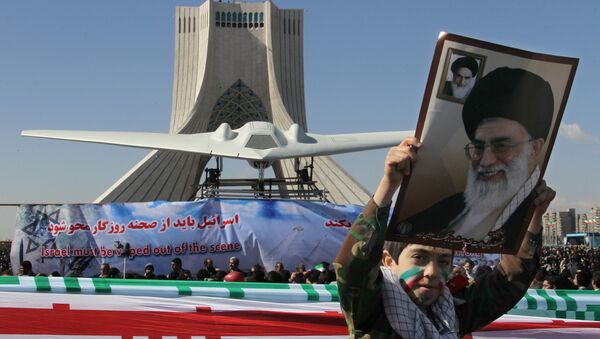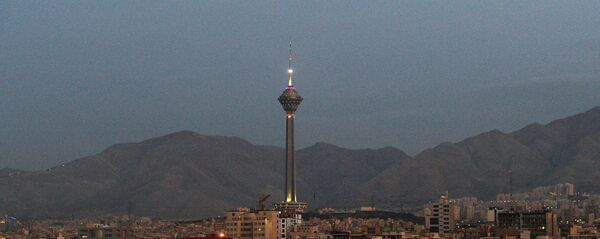Radio Sputnik spoke about the anniversary of the Iranian revolution with Alexander Azadgan, professor of international political economy, senior geopolitical analyst and editor-at-large with Imperia News
Sputnik: So what are the outcomes of this revolution? Can you share them with our listeners?
Alexander Azadgan: Sure, this revolution really stirred the Middle East like nothing has in a few centuries, actually. It's invigorated the feelings that people felt all the way, you could say, from Morocco to Pakistan, but specifically in Egypt, when Gamal Nasser came to power; he really fanned the flames of pan-Arab nationalism.
Obviously, the Iranians are a different race, a different faith, but the Iranians have been the torch-carriers for the Shia sect of Islam, which has historically been the revolutionary element within Islam, going all the way back to the Prophet's son-in-law, who was also his cousin.
His name was Ali. So it changed not just the geopolitical but also the socio-religious orientation of the Middle East, and it really reinvigorated political Islam.
Also, Iran demonstrated to the world that it will stand up to especially, imperialists, what they define as imperialism: the West, particularly the United States, and the reason was not because they're anti- American or the nature of the revolution was anti-American; it wasn't, it was solely because of what happened in 1953.
They had a popularly elected government under Prime Minister Mosaddegh, what was really behind Mosaddegh was the nationalisation of Iranian oil, and Mosaddegh really stood up to the Shah — the King. After he was toppled by the United States, actually the operation was a CIA and MI6 operation carried out through Theodore Roosevelt's grandson, a character named Kermit Roosevelt II.
READ MORE: Tehran 'Will Raze Tel Aviv, Haifa' if US Attacks — Iranian Islamic Guard Comdr.
When Prime Minister Mosaddegh stood up to the Shah, he was actually pulled down, then really the anti-shah, anti-monarchy views really (became) invigorated and they finally manifested in 1979.
It was a violent revolution, it brought pretty much everybody together, the Marxist-Leninists, the secularists, this very important party called the Iranian National Resistance Party, which was the party of Prime Minister Mosaddegh that I mentioned, and, of course, the clerical establishment in Iran which at that time carried a lot of respect because of the persecution that they experienced under the Shah's father Reza Shah, the modern founder of Iran, if you may.
Sputnik: I was going to ask you about the involvement with regard to Britain, being a very active supporter of the revolution, what did the UK gain from that then?
Alexander Azadgan: We have to be careful with that. The UK was not necessarily a supporter of the revolution, they were pretty much anti-shah because you have to understand both the Shah and his father were put into power by the British, this is a historical fact, but both of them the Shah's father leaned towards the Germans and the Austrians and the son, at least towards the end of his rule, really stood up to the British.
I mean his interviews are on YouTube and he is speaking the language of the revolutionaries, be it the secular revolutionaries or a Marxist, Islamist, or the clerical establishment.
READ MORE: Dreaming of Empire: UK Secures 'Permanent' Naval Base 'East of Suez' in Oman
So from that perspective, and this is happening right now, by the way. When Mohammed bin Salman, believe me, when he's going to start standing up to the United States he's going to be dethroned when he becomes the King.
So it was essentially the same situation with the Shah; when he stood up to them and also Washington then they found valid reasons to support the forces that were against him, but this happened by default, not necessarily by design.
So if we say that the UK was supportive of the revolution, from the stance of media, yes, the BBC, if you listen to those broadcasts and they're available on YouTube; you'd think, you would assume they were pro-revolution.
As far as my take on the Iranian-British relations today, I was giving a lecture at a think-tank a few days ago and I told my audience that no enemy or no ally remains forever, nothing stands forever.
Look at the relationship between Britain and Iran in the 1920s, 30s and 40s. Iran was sternly anti-British. The Iranian oil company was called the Anglo-Persian oil company, which evolved into what British Petroleum is today.
The British took Iranian oil and the Americans took the Saudi oil, it became the Amoco company. So a country like that, they have some issues, but the Embassy's back there and the relations are there, the diplomatic relations are solid. Same thing with Russia. Russian and Iran were on very bad terms for many decades, but Russia happens to be an ally of Iran today. So, in my opinion, the Iranian-British relations are okay, I wouldn't say solid.
The views and opinions expressed by the speaker do not necessarily reflect those of Sputnik.





